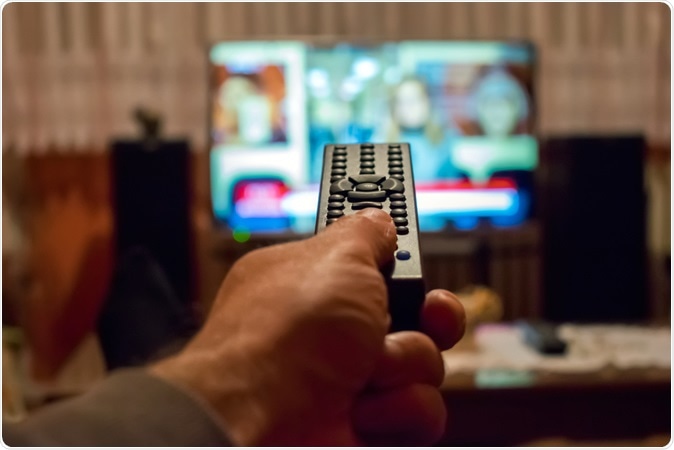According to new research that looked at the TV viewing habits and sleep histories of 423 persons between ages of 18 and 25 years, binge watching or consuming multiple episodes of a TV series at one sitting can significantly affect sleep. Regular TV watching on the other hand does not affect sleep detrimentally to that extent according to study author Liese Exelmans a doctoral researcher at the University of Leuven's School of Mass Communication Research in Belgium. The study was published in the current issue of the Journal of Clinical Sleep Medicine.

Image Credit: Goran Petric / Shutterstock
TV viewing has changed with 63% of American households using a streaming service. There is little that has been studied to assess the effects of binge watching on individuals. Among the 423 participants in this unique study, 61.9% were females. They had to complete an online survey that looked at regular television viewing habits, binge viewing, sleep quality, assessment of fatigue, assessment of insomnia (difficulty sleeping) and assessment of levels of arousal before falling asleep called pre sleep arousal. For measuring sleep quality, Pittsburgh Sleep Quality Index was used as a test. To assess fatigue, insomnia and pre-sleep arousal similarly Fatigue Assessment Scale, Bergen Insomnia Scale and Pre-Sleep Arousal Scale were used respectively.
The study asked participants to provide answers to questionnaires that asked them about their TV viewing habits. Alarmingly 80.6% (341 in number) respondents’ answers reflected the fact that they were binge watchers. Of the binge watchers, around a fifth or 20.2% had binge-watched at least a few times each week in the previous month and 7% of the respondents who were binge watchers were doing it almost every day over the previous month before the survey.
When asked about the sleep patterns, the respondents on an average reported a little over seven and a half hours of sleep a night meeting the adults sleep requirement guidelines that needs adults to get at least seven to nine hours sleep every night. On assessing quality of sleep, 32.6% had a poor sleep quality associated with being a binge viewer. Pre sleep arousal was also higher among binge watchers. They also were more tired and felt less rested after a night of sleep although they did get reasonable hours of sleep.
Exelmans explained that being “engaged with same content for hours on end” is the key to the detrimental effect these binge watching tendencies seem to have. This means that the viewer who has taken in a few hours of a show cannot stop thinking about it and the brain stays alert speculating what would happen next. This increases alertness and heart rate and the brain takes longer to cool and finally fall asleep. This is what results in poor quality of sleep and waking up feeling tired the next day.
Study authors write that interventions that could be used to prevent this damage to sleep quality include alerting the TV viewers regarding excessive viewing duration and the harm it causes and also reducing the alertness or arousal before sleep.
As advice the researchers say that watching TV should be within a timeline and that timeline should be stuck to stop the TV viewing from affecting sleep. A regular bed time schedule and routine helps improve the self control to prevent oneself from watching hours of same TV content. Exelmans said building good sleep habits may take some time but once in place, the adherence is good and outcomes are better.
Experts believe that binge watching has come to be the commonest form of TV viewing and it is not likely that people would give it up any time soon. For many it is a way to unwind after a stressful day at work. What it does is damage the quality of sleep. According to some experts, watching TV with friends or family might improve TV viewing habits asking them more enjoyable and less of an encroachment into sleep habits.